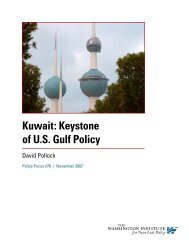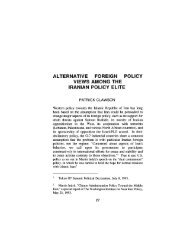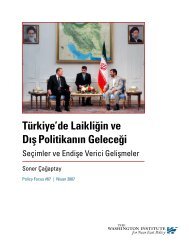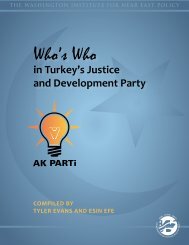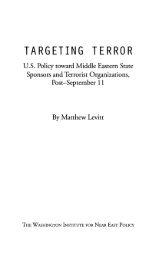Michael Eisenstadt David Pollock How the United States Benefits ...
Michael Eisenstadt David Pollock How the United States Benefits ...
Michael Eisenstadt David Pollock How the United States Benefits ...
Create successful ePaper yourself
Turn your PDF publications into a flip-book with our unique Google optimized e-Paper software.
with a number of o<strong>the</strong>r countries, including<br />
regional neighbors Jordan and Kuwait) has long<br />
been designated a “major non-NATO ally,” and<br />
because Israel possesses recognized cutting-edge<br />
cybersecurity capabilities, it would be a logical<br />
candidate for inclusion in <strong>the</strong> next tier of official<br />
U.S. multilateral efforts in this domain. The explicit<br />
mention of China, Russia, and Iran as potential<br />
cybersecurity threats—first in October 2011 FBI<br />
and Department of Defense reports to Congress<br />
and <strong>the</strong>n in <strong>the</strong> January 2012 U.S. intelligence<br />
community statement to Congress—may be<br />
ano<strong>the</strong>r indicator of <strong>the</strong> potential for enhancing<br />
<strong>the</strong> official U.S.-Israel cyber partnership. 50<br />
Water and Food Security<br />
There is a broad consensus among both governmental<br />
and nongovernmental specialists that large<br />
parts of Africa, <strong>the</strong> Middle East, and South Asia<br />
will likely experience destabilizing water and food<br />
shortages in <strong>the</strong> not-too-distant future, due to rapid<br />
population growth, climate change, and economic<br />
development, and that <strong>the</strong>se shortages will pose<br />
major policy challenges for <strong>the</strong> developed world. 51<br />
Though not a developing country, <strong>the</strong> <strong>United</strong> <strong>States</strong><br />
itself is hardly immune to <strong>the</strong>se trends. The U.S.<br />
southwest has in recent years experienced severe<br />
drought conditions that have stressed this already<br />
arid region, reducing crop yields and livestock production<br />
and contributing to a spate of devastating<br />
wildfires; in <strong>the</strong> first half of 2012 alone, more than<br />
half <strong>the</strong> country experienced drought conditions. 52<br />
Dealing with <strong>the</strong>se challenges will require new<br />
approaches to water management and agriculture.<br />
Israel has been developing innovative solutions<br />
to <strong>the</strong> problems of water scarcity, desertification,<br />
and arid region agriculture since its establishment. 53<br />
Israel recycles about 80 percent of its wastewater,<br />
<strong>the</strong> highest level in <strong>the</strong> world, and is actively seeking<br />
to share its expertise in this area in international<br />
forums. Israel is also a pioneer of drip irrigation<br />
for farming in arid regions, with Israeli-developed<br />
products capturing 50 percent of global market<br />
share for this particular technology. 54 For instance,<br />
<strong>How</strong> <strong>the</strong> <strong>United</strong> <strong>States</strong> <strong>Benefits</strong> from Its Alliance with Israel<br />
<strong>the</strong> Israeli drip-irrigation company Netafim,<br />
with a presence in more than 100 countries, has<br />
established a major manufacturing facility for its<br />
products in Fresno, California, generating hundreds<br />
of jobs and millions of dollars in revenues. 55<br />
A recent report by <strong>the</strong> Cleantech Group and <strong>the</strong><br />
World Wildlife Fund put Israel in second place,<br />
after Denmark, in fostering innovations that help<br />
provide environmentally sustainable solutions to<br />
global water, food, energy, climate change, and<br />
related problems. 56 Despite Israel’s small domestic<br />
market and inconsistent environmental policies, <strong>the</strong><br />
report rated Israel as “<strong>the</strong> clear winner” in terms of<br />
emerging cleantech innovation. The evidence cited<br />
includes <strong>the</strong> following: “by far <strong>the</strong> most Global<br />
Cleantech 100 companies per GDP, <strong>the</strong> second<br />
highest concentration of cleantech VC [venture<br />
capital] activity,” and <strong>the</strong> sixth highest global rating<br />
for “environmental technology patent filing.” Israel,<br />
according to this report, “is especially strong in<br />
water innovation”—motivated by “<strong>the</strong> serious water<br />
scarcity that affects <strong>the</strong> region” and by “Mekorot,<br />
<strong>the</strong> highly innovative water utility that regularly<br />
partners with local cleantech start-ups.” 57 A specific<br />
example noted is <strong>the</strong> newly patented TaKaDu<br />
water network monitoring service for detecting<br />
water loss, which Israel has begun exporting and<br />
installing in Europe and elsewhere.<br />
Desalination is ano<strong>the</strong>r area in which Israel<br />
has developed expertise, particularly in <strong>the</strong> reverse<br />
osmosis process. Short of natural freshwater<br />
sources, Israel has increased its desalination<br />
capacity exponentially in <strong>the</strong> past half decade, from<br />
20 million cubic meters in 2005 to 300 million<br />
cubic meters in 2011—with firm plans to double<br />
that number by 2013. It now ranks fourth in <strong>the</strong><br />
world in freshwater production by reverse osmosis,<br />
after Spain, Saudi Arabia, and Algeria (each of<br />
which has a population at least three times that of<br />
Israel). While reverse osmosis does not produce<br />
electricity, as does <strong>the</strong> more common desalination<br />
method—<strong>the</strong>rmal “double process,” or “combined<br />
process,” distillation—<strong>the</strong> osmotic method requires<br />
less energy input and may be more suitable in<br />
The WashingTon insTiTuTe for near easT Policy 37



